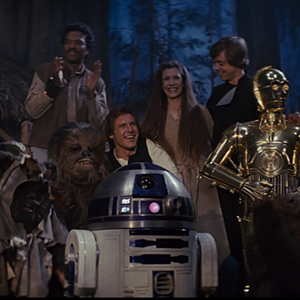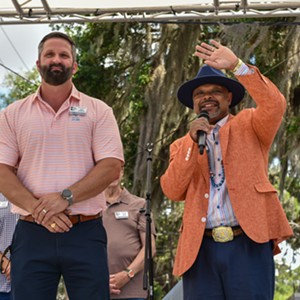It is appalling that the most segregated hour of Christian America is eleven o’clock on Sunday morning, the same hour when many are standing to sing: “In Christ There Is No East Nor West.”
-- Martin Luther King Jr., 1958
Race and religion are the two most central and inescapable issues in the South. No aspect of life down here is unaffected, for better or worse, by one or both of these two irresistible magnetic poles of our region’s society and history.
As Dr. King understood, despite the importance and all-pervasive presence of race and religion, those are the very two things least likely to be discussed in the same conversation in these parts.
But when they are, amazing things can happen.
This past Saturday, in an almost totally unreported event -- Connect Savannah was the only local media outlet in attendance -- several hundred people from two of Savannah’s most influential churches gathered as part of a renewed effort to talk about race and religion -- specifically, to bring black and white men together to address pressing social issues, to “man up,” as one organizer put it.
Fittingly, many of Savannah’s most important leaders, both spiritual and elected, were there. Mayor Otis Johnson attended, as well as former Mayor Floyd Adams Jr. and President of the Georgia Senate Eric Johnson.
Fellowship was shared, meals were enjoyed, hymns were sung and hands were clapped. But under it all was a quiet determination to close the racial divide once and for all, to not let the lingering de facto segregation of Savannah -- a voluntary version of the enforced segregation Dr. King was decrying in the above quote -- ever again be a deterrent to quality of life, both here and in the hereafter.
Hosted by St. John Baptist Church on Hartridge Street -- a predominantly African-American congregation that dubs itself “The Mighty Fortress” -- the gathering was a joint effort by St. John and the predominantly white Savannah Christian Church.
This is no small thing. Most of our regular readers probably wouldn’t expect an article about a church meeting to be our lead story, but the case can be made that of all the events that happened this past weekend, the meeting at St. John may have been the single most important and far-reaching one.
Church-related events almost never show up on the media’s radar screen. But as many of us in the media are slowly and sometimes reluctantly learning, they can represent huge, sometimes seismic, movements on the part of everyday people -- doubly so when the congregations involved are as large and energetic as these two.
While meal preparation for the expansive breakfast buffet began well before dawn that morning, the actual event began with a meal at 8:30, followed by a spirited service in the large and spacious interior of the recently restored St. John’s sanctuary.
Before the service, I was able to chat at length with Mayor Johnson, Adams and Senator Johnson as well as with St. John’s Pastor George Lee and Savannah Christian’s Pastor Cam Huxford.
One of the prime organizers of the event, St. John’s Jessie Williams, made it plain that this was not just a feel-good photo op -- it was just one meeting of many more to come.
“It’s not an event -- it’s a process,” he said.
“This is not so much about reconciliation as it is relationships,” agreed Huxford, who has spent the last 20 years building Savannah Christian Church. “We’re coming together as brothers in Christ, to cross all racial and denominational lines.”
Rather than playing up the racial bridge between the congregations, St. John’s Lee explained that “We’re saying it’s natural, it’s expected. This should be looked at no differently than a family reunion would.”
Savannah Christian’s Lee Vanatta said his congregation has already enthusiastically embraced the concept.
“We’re getting a huge response, especially from contractors and professionals and people like that,” Vanatta said. “They really want to start offering their services to disadvantaged and low-income people around town, like senior citizens who are always getting ripped off. If we can accomplish that, even that alone would just be huge.”
The goal of Saturday’s meeting was not only to bring the men’s groups of the congregations together, but to serve as a model for other churches in the community to also cross racial divides on a regular basis.
So why the focus on men?
Practically speaking, organizers say the meeting was a natural outgrowth of the strength of the two churches’ men’s organizations.
But ideally speaking, the meeting addresses the male members of the churches for more specific reasons.
A clue is contained in Proverbs, Chapter 27: “As iron sharpens iron, so one man sharpens another.”
“The men of our community have largely abdicated spiritual leadership,” Huxford explained. “This is a way for our men to reclaim that type of character-driven leadership and take it with them into their families and into their lives. Social problems like crime come from a lack of moral leadership, a lack of character.”
Mayor Johnson, who has for years lobbied long and hard for the men of Savannah to step up to the plate and be better role models, was even more blunt.
“We’re in a spiritual crisis,” the mayor said flatly.
Red flags go up whenever a journalist hears a politician talking about religion. Rightly or wrongly, it’s deeply ingrained in our profession to be skeptical whenever we see lawmakers and clergy getting too cozy.
But the political leaders in attendance at St. John this weekend took a much broader -- and perhaps controversial -- view of the separation of church and state.
“That’s mostly a legal dichotomy. In most people’s lives they don’t think about a difference between church and state,” said Mayor Johnson. “In most people’s minds they don’t draw a line between the two. Most people have a more holistic approach. I mean, we’ve got ‘In God We Trust’ on our money for a reason.”
The mayor sees Thomas Jefferson’s idea of separating church and state as primarily a guarantee of freedom from religious persecution.
“That was written mainly to allow religious freedom and to keep the government from establishing a state religion,” he said. “At the time you had all these people fleeing religious persecution in Europe and coming here. Look at the Quakers, look at the people who settled at Ebenezer.”
True to form, the mayor used an analogy he said he often relied on during his teaching days.
“I used to draw these interrelating circles. There’s economic life, spiritual life, educational life, political life, and social life -- they all come together to make society integrated and interrelated.”
Johnson’s predecessor in the mayor’s office, Floyd Adams Jr., said simply, “We were church members before we were mayors.”
Explaining that his family is somewhat unique in that his parents were Episcopalian and Methodist, while he and his siblings “all turned into Catholics,” Adams said it’s past time for churches to address social problems in a serious way.
“We’ve all come to the conclusion that churches need to do more of this kind of outreach in the community,” Adams said. “We’ve got to get away from the attitude of going to church as kind of a drive-in, walk-out thing.”
Mayor Johnson concluded, “I’m just an old academician. We need people in the churches to talk about our spiritual and moral obligations. There’s only so much politicians can do.”
Echoing the mayor was another Johnson, Georgia Senate majority leader and President Pro Tem Eric Johnson. Though the two Johnsons couldn’t be farther apart politically -- the senator being a white conservative Republican from the private sector and the mayor being a black liberal Democrat from academia -- the two have formed a surprisingly effective bipartisan political relationship, and were in total agreement about the need for a more sound spiritual basis in the community.
“There’s only so much government can do,” Sen. Johnson said. “We have to use the strength of our community of Christian believers to take care of our brothers. And we have to start with ourselves.”
St. John’s Pastor Lee said the idea of the church driving the community is part and parcel of black life in the United States in general, and the South in particular.
“For African Americans, the church has always been the primary force for leadership,” said Lee. “We like to call the church the ‘cultural womb’ of the African-American community. And this event is all about returning to that cultural womb and being reborn again.
“I’m just happy that God has chosen us and chosen this place for this event,” Lee concluded. “You know, we didn’t choose any of this. God is speaking through us and He’s the one who chose us for this, right here in Savannah, Georgia.”
The term “megachurch” has become overused lately, yet another trite media euphemism. But if ever a church was mega, it would be Savannah Christian Church.
A sprawling compound of spiritual services on a huge tract of land on the southside that church leaders refer to as a “campus,” Savannah Christian is currently the largest church in the area, bar none, and growing every day.
A Sunday night “LateChurch” service marketed to Generation Xers downtown draws several hundred a week. An Eastside campus is being built right now.
The church’s global missionary efforts boggle the mind, ranging from Ghana to Haiti to Nicaragua to the Ukraine. A church annex of sorts is now being constructed in Darjeeling, India.
For his part, Savannah Christian Pastor Cam Huxford, while not enamored of the “megachurch” label, acknowledges the phenomenon as well as one of its more unsavory tendencies: The tendency for megachurches to be places where white suburbanites go to feel good about themselves without having to interact with people that don’t look like them or have similar size bank accounts.
While Savannah Christian, with its extensive missionary and outreach programs, seems determined -- I guess we can’t say “hell-bent” -- to avoid this pitfall, Huxford says he’s always on guard.
“We do want to make sure not to fall into that fortress mentality, with one suburban enclave over here and another enclave over there,” Huxford says. “Hopefully church will be more like a gas station -- you fill up and then go out.”
It’s one thing for a black church in Savannah to open its doors to whites. That is so commonplace as to be unremarkable. But for black people to be welcomed into a white church in Savannah -- well, not always so commonplace and not necessarily so unremarkable.
So the million-dollar question is: Will Savannah Christian Church reciprocate by hosting large numbers of the St. John congregation, as “The Mighty Fortress” did for its white brothers from the southside this past weekend?
“I’m thrilled about the growing group of black families attending Savannah Christian,” Huxford said. “And I’m thrilled that so many members of St. John’s congregation have been coming over to our church every week for months to help plan and prepare for this event. And I would be absolutely thrilled for Savannah Christian to host this event next time.
“It's like Pastor Lee said -- we view this as a family reunion. And with family reunions, you don't think anything about it moving around and being held in a different place each time."
To comment, e-mail us at




























